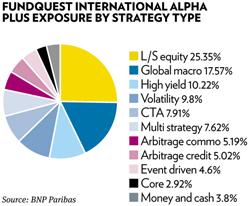Volatile markets cause selection headaches
Antony John, CEO of BNP Paribas unit FundQuest, discusses the increased challenges faced by fund selectors in these tough economic conditions and the extra skills they need to assess passive in addition to active investments
A low growth, high volatility, mid-crisis environment is not ideal for anybody, but proves a particularly tough time for fund selectors.
“You have to be a lot more on top of managers,” says Antony John, London-based CEO of FundQuest, the manager and asset selection branch of French bank BNP Paribas, which oversees €25bn of assets, 65 per cent of which are for internal clients and the balance for other institutions.
“These are unprecedented times, but I think fund managers are reacting in slightly different ways to the circumstances.”
He seems many fund managers trying to manage cash more effectively, in many cases making the biggest allocations they can get away with, while they wait for the opportunity to make active, off-benchmark bets. Others are fearful of falling foul of stormy markets and are sticking as close to the index as possible, because they do not know which way to bet.
Another trend identified by Mr John is increased use by fund managers of derivatives, not for the purpose of efficient portfolio management, but as an investment opportunity in themselves. “You need to know if they have the processes and skills to do that effectively,” he says.
Mr John was previously head of IMS, a highly regarded specialist firm in the UK, servicing mainly smaller pension funds, which was bought nearly four years ago by the French bank in order to strengthen its qualitative capacity, to match an already strong quantitative asset selection process.
BNP Paribas recently completed the sale of the US part of the FundQuest business in London, which was more involved in providing ‘turnkey’ solutions to other asset management companies than choosing funds, sectors and assisting with asset allocations.
This group policy decision may have been for the greater good, but it seems Mr John misses the chance of speaking to staff in the US on a daily basis to get their feedback on markets and local managers. “We might create some permanent resource out there again to get local insight,” he admits.
At the same time, he also acknowledges that North American managers are not the powerhouses they once were, with many operators in US equities struggling to beat the market and exchange traded funds (ETFs) and enhanced indexation often becoming the norm for investors. “You need to do as much research on ETFs as active managers,” reckons Mr John, whose unit recently published a paper entitled Why ETFs are not alike, which predated the UBS rogue trading episode.
If Mr John is asked to point to an area where specialist managers are currently performing ahead of the pack it is in the domestic smaller cap sectors. “If you take a global view, the guys who are having a better time – while nobody is having a good time – are domestically-oriented small and micro cap managers able to identify firms with a domestic focus, which are to some extent more insulated from the global environment and offer growth potential.”
He also mentions that managers working in some specialist areas such as clean energy may be worth watching.
The systems of manager oversight, and in particular the technology-led platforms he found at BNP Paribas, give him a much better look-through into the portfolios of such managers than he ever had at IMS, yet fund selection remains a people-oriented rather than an industrial business, says Mr John.
Clients are not asking too much about any disquiet or potential balance sheet problems at the French bank, he notes. “I have been 25 plus years in the industry,” with a good record both at UK house Hill Samuel and Swiss player Lombard Odier. “There is an expectation that if there is a problem, I will tell people about it. My reputation is at stake here too.”
As well as the burgeoning private bank of BNP Paribas, which has grown substantially from mergers and now allows FundQuest to act as sole arbiter of investments with external fund managers, the client list includes Shinhan Bank in Korea, Standard Bank, for which FundQuest runs a fund of funds and the Carrefour and CAVP pension funds in France.
While the partnership structure of Swiss private banks can often lead to a see-saw of emotions and ideas from one strong personality to another, despite their undoubted strength in investment disciplines, the French banks still have a peculiar supranational quality. This is not necessarily a bad thing, believes Mr John.
“All French banks, BNP Paribas included, are still connected by an umbilical cord that goes straight to the heart of the government in France,” he says. “That cord runs both ways in terms of influence and policy.”




